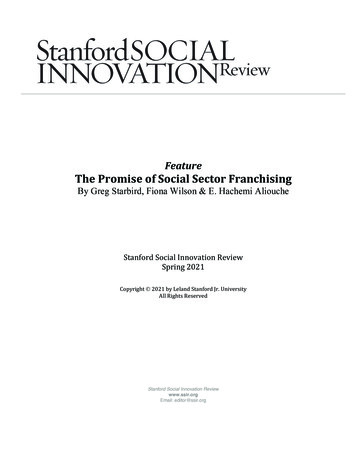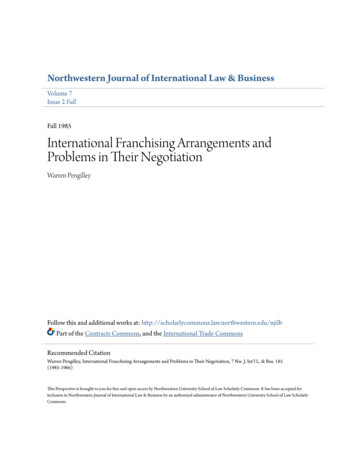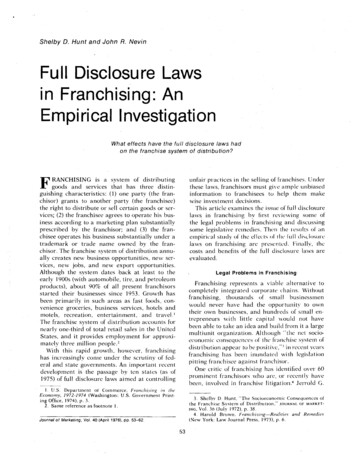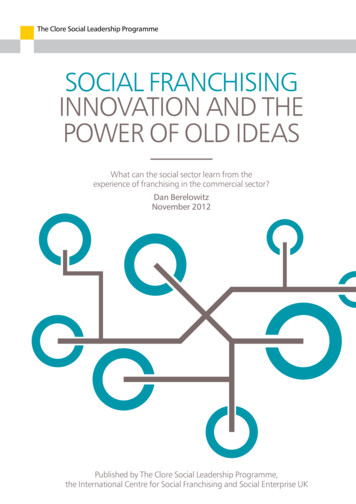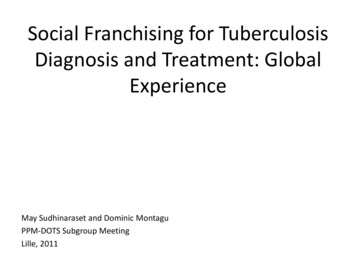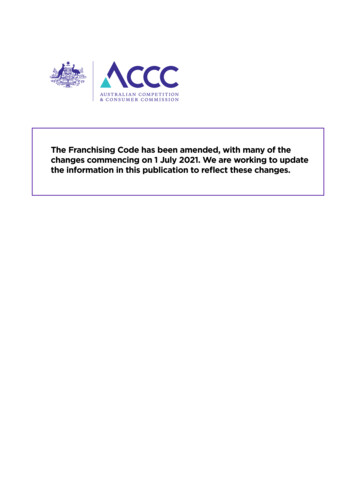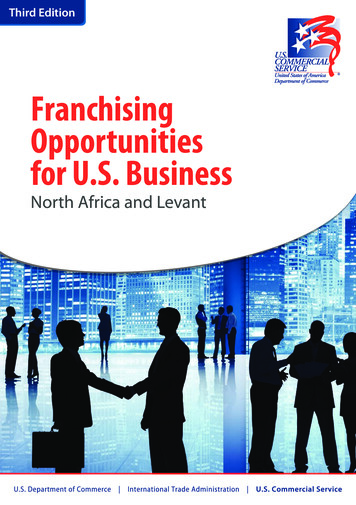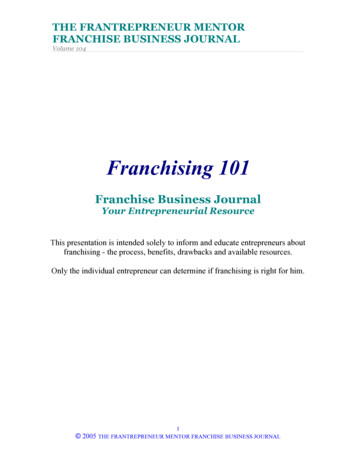
Transcription
THE FRANTREPRENEUR MENTORFRANCHISE BUSINESS JOURNALVolume 104Franchising 101Franchise Business JournalYour Entrepreneurial ResourceThis presentation is intended solely to inform and educate entrepreneurs aboutfranchising - the process, benefits, drawbacks and available resources.Only the individual entrepreneur can determine if franchising is right for him. 20051THE FRANTREPRENEUR MENTOR FRANCHISE BUSINESS JOURNAL
THE FRANTREPRENEUR MENTORFRANCHISE BUSINESS JOURNALVolume 104What is Franchising?Franchising is a method of distributing goods orservices to consumers. The franchise system ownsthe right to the trademark of the business. Thefranchisee purchases the right to use the trademarkand operating system.Most people associate the word “franchise” with fastfood restaurants. But, there are many more types offranchise businesses, including everything fromadvertising to automobile repair, printing services toparty supplies and many more. 20052THE FRANTREPRENEUR MENTOR FRANCHISE BUSINESS JOURNAL
THE FRANTREPRENEUR MENTORFRANCHISE BUSINESS JOURNALVolume 104Categories of Franchises Accounting/Tax ServicesAdvertising/Direct MailAuto & Truck RentalsAutomotive Products/ServicesBatteries-Retail & Comm.Beverages: SpecialBusiness BrokersBusiness/Mgmt ConsultantsCampgroundsCheck Cashing/Financial ServicesChildren’s ServicesClothing and ShoesComputer/Electronics/InternetConstruction MaterialsConsumer Buying ServicesConvenience StoresCosmeticsDating ServicesDrug StoresEducational Products/ServicesEmployment ServicesFitnessFlorist ShopsFood/RestaurantsGolf Products/ServicesGreeting CardsHair Salons & ServicesHealth Aids & ServicesHome FurnishingsHome InspectionHotels and Motels Janitorial ServicesJewelryLaundry & Dry CleaningLawn/Garden/AgricultureMaid & Personal ServicesMaintenanceMarine ServicesOptical Aids & ServicesPackaging/Ship/MailPainting ServicesParalegal ServicesPayroll ServicesPest Control ServicesPet Sales/SuppliesPhotographyPrinting/CopyingReal Estate ServicesRecreational ServicesRental Equipment & SuppliesRetail StoresSecurity SystemsSenior CareSign Products & ServicesTanning CentersTelecommunicationsTransportation ServicesTravel AgentsVitamin & Mineral StoresWeight Control Insurance 20053THE FRANTREPRENEUR MENTOR FRANCHISE BUSINESS JOURNAL
THE FRANTREPRENEUR MENTORFRANCHISE BUSINESS JOURNALVolume 104Well-Known Franchise Names McDonald’sSubwayCurvesAlphagraphics7-Eleven, Inc.Barbizon School of ModelingBaskin RobbinsBig O TiresBlockbusterCentury 21 Real EstateCourtyard by MarriottDairy QueenDale CarnegieDunkin’ DonutsKentucky Fried ChickenFuddruckersGold’s Gym 2005 Great Clip’s H& R Block IHOP – International House ofPancakes Jenny Craig Kwik Copy MAACO Molly Maid New Horizon’s ComputerLearning Once Upon A Child Papa John’s Pizza Radio Shack Seattle’s Best Coffee Taco Bell Wild Bird Centers of America4THE FRANTREPRENEUR MENTOR FRANCHISE BUSINESS JOURNAL
THE FRANTREPRENEUR MENTORFRANCHISE BUSINESS JOURNALVolume 104What is a Franchisee?“Frantrepreneur”(fran*tre*pre*neur) n.A person with the desire to become a franchise businessowner and the ability to follow a proven business systemfor the benefit of his/her own personal and professionalgains.The Frantrepreneur Mentality“I’m in business for myself, but not by myself”.“I have the opportunity to learn from the success and failure ofothers.”“I want a ‘bottled’ process for success that I can use in developingmy own successful business.”“Why would I work for someone else when I can work for myselfand reap the rewards of my efforts?""Why would I spend years and the investment required to establisha successful brand when I could buy a franchise which providesimmediate access to a successful business system and a brandname which others already have made successful?" 20055THE FRANTREPRENEUR MENTOR FRANCHISE BUSINESS JOURNAL
THE FRANTREPRENEUR MENTORFRANCHISE BUSINESS JOURNALVolume 104Franchise OptionsTYPE: Traditional retail Mobile products/services Work from homeOWNERSHIP: Hands-on Passive Part-time/full-timeOWNERSHIP: Single unit franchise Multiple units Master franchiser Area developerPRODUCT/SERVICE: 75 categories - an endless array of possibilities Something to match anyone’s background, skills andinterests 20056THE FRANTREPRENEUR MENTOR FRANCHISE BUSINESS JOURNAL
THE FRANTREPRENEUR MENTORFRANCHISE BUSINESS JOURNALVolume 104Franchise Statistics Franchise businesses account for about 50% of all retail sales inthe United States. 1 out of every 12 business is a franchised business. A new franchised business is opened every 8 minutes of everybusiness day. Franchise businesses employ more than 14 million Americans. There are an estimated 6,500 franchise companies operating inthe U.S. doing business through more than 316,000 retailoutlets. More than 75 industries use franchising to distribute goods andservices to consumers. A 1999 study by The United States Chamber of Commercefound that 86% of franchises opened within the last five yearswere still under the same ownership and 97% of them were stillopen for business. A U.S. department of commerce study conducted from 1971 to1997 showed that during that time less than 5% franchisebusinesses were closed each year. Compare that to a U.S. SmallBusiness Administration study conducted from 1978 to 1998,which found that 62% of non-franchised businesses closedwithin the first 6 years of their existence due to failure,bankruptcy, etc. Total sales by franchised businesses are projected to reach 1.7trillion, this year. In 2000, the median gross annual income, before taxes, offranchisees was in the 75,000 to 124,000 range, with over30% of franchisees earning over 150,000 per year. 20057THE FRANTREPRENEUR MENTOR FRANCHISE BUSINESS JOURNAL
THE FRANTREPRENEUR MENTORFRANCHISE BUSINESS JOURNALVolume 104Franchise Success Rate 20058THE FRANTREPRENEUR MENTOR FRANCHISE BUSINESS JOURNAL
THE FRANTREPRENEUR MENTORFRANCHISE BUSINESS JOURNALVolume 104Franchises have a 97% success rate. Most people can’teven predict that they can keep their jobs with a 97%certainty. 20059THE FRANTREPRENEUR MENTOR FRANCHISE BUSINESS JOURNAL
THE FRANTREPRENEUR MENTORFRANCHISE BUSINESS JOURNALVolume 104Advantages of Buying a Franchise Franchiser business practices are tightly regulated by the federalgovernment Franchisers have a vested interest in your success. The marketplace has already been checked out by the franchiserand determined the system to be successful. The franchiser utilizes collective buying power and passes onthe discounts to you. Local and national advertising for the franchise operation as awhole is supplied by the franchiser. Supervision, training programs and consulting are readilyavailable from the franchiser. Managerial, operational and accounting systems are in place tofacilitate your success. Ongoing research and product development is provided by thefranchiser. 200510THE FRANTREPRENEUR MENTOR FRANCHISE BUSINESS JOURNAL
THE FRANTREPRENEUR MENTORFRANCHISE BUSINESS JOURNALVolume 104Disadvantages of Buying a Franchise You have to pay the franchiser royalties. The contract with the franchiser must be renewed after a certainperiod of time. There is a lack of flexibility because business methods aredictated by the franchiser. The franchiser's problems are also your problems. You may be obliged to buy products supplied by the franchiserrather than the most cost-effective product available. You don’t get to make all of the decisions in how to run yourbusiness. In some ways, owning a franchise is like a cross betweenbusiness ownership and employment. 200511THE FRANTREPRENEUR MENTOR FRANCHISE BUSINESS JOURNAL
THE FRANTREPRENEUR MENTORFRANCHISE BUSINESS JOURNALVolume 104Established versus Newer FranchisesPossible Advantages of Established Franchises: Name recognition More regional and national advertising Experienced management More refined training and support Better purchasing power with established price discountsPossible Advantages of Newer Franchises: Exciting, cutting-edge concepts Business may have been designed to avoid mistakes made byolder franchises Lower cost of entry and royalties More opportunity to share in equity growth of the company More flexibility and latitude in working with franchisees 200512THE FRANTREPRENEUR MENTOR FRANCHISE BUSINESS JOURNAL
THE FRANTREPRENEUR MENTORFRANCHISE BUSINESS JOURNALVolume 104Questions To Ask YourselfHow much capital do you have to invest?How much liquid assets do you have?Do you require a specific level of annual income?Are you interested in pursuing a particular field?Are you interested in retail sales or performing a service?Do you want a part-time or fulltime opportunity?How many hours are you willing to work?Do you want to operate the business yourself or hire a manager?Do you want to have employees?Do you want to have inventories?Do you want to have Accounts Receivables?Will franchise ownership be your primary source of income orwill it supplement your current income? Would you be happy operating the business for the next 10years? Would you like to own several outlets or only one? 200513THE FRANTREPRENEUR MENTOR FRANCHISE BUSINESS JOURNAL
THE FRANTREPRENEUR MENTORFRANCHISE BUSINESS JOURNALVolume 104Questions to Ask a Franchiser Determine what assistance the franchiser provides. Do theyassist with training, store design, location construction, siteselection, and feasibility studies? Do they have any access to demographic studies to get anunderstanding of the audience within the market area? What types of support will the franchiser provide once yourfranchise has opened its doors? After the initial investment, will there be additional financialobligations requiring working capital? Does the franchiser offer any form of financing? Ask the franchiser how many franchises have been sold in thestate you will be operating in during the last 12 months, andhow many have been opened for business? What types of territorial restrictions and protections have beenset up by the franchiser? Is the franchiser planning on expanding within your state? Arethey focusing on any specific locations? What arrangements are established through the franchiser interms of product supply? Ask if the franchiser has been forced to terminate any of itsfranchisees and detail the reasons for this decision. Have anyfranchisees failed or gone bankrupt? Are there any current lawsuits pending or past judgmentsagainst the franchiser? What steps are taken to settle disputesbetween the franchiser and franchisees? 200514THE FRANTREPRENEUR MENTOR FRANCHISE BUSINESS JOURNAL
THE FRANTREPRENEUR MENTORFRANCHISE BUSINESS JOURNALVolume 104Questions to Ask Franchisees How long have you owned your franchise?Is your franchise profitable?In which month did you reach your breakeven point?Have you made approximately the same profit that was forecastin the disclosure document?Were your opening costs consistent with the original projectionsin the disclosure document?Are you satisfied with the franchiser?Are you satisfied with the product or service?Is the operations manual, clear, up-to-date and adequate?Are you satisfied with the marketing and promotional assistanceprovided by the franchiser?Was the initial training and ongoing support sufficient for youto operate your business?What was your background prior to buying your franchise andwas it beneficial to your success?Are deliveries of goods provided by the franchiser timely andcompetitively priced?Is the franchiser fair and amicable to work with?Does the franchiser listen and help you with your concerns?Have you or other franchisees had any disputes with thefranchiser? What was their nature? Were they resolved fairly?Do you know of any disputes between the franchiser and thegovernment?Do you know of any disputes with competitors?Who are the major competitors? 200515THE FRANTREPRENEUR MENTOR FRANCHISE BUSINESS JOURNAL
THE FRANTREPRENEUR MENTORFRANCHISE BUSINESS JOURNALVolume 104Common Mistakes of ProspectiveFranchisees Not reading, understanding or asking questions about the FDD(Franchise Disclosure Document), franchise agreement andother legal documents Not understanding the responsibilities of the franchisee and theobligations of the franchiser Not seeking sound legal and financial advisors Not verifying oral representations of the franchiser,representatives or brokers Not contacting enough current franchisees Not contacting closed, sold or changed franchisees andconfirming reasons Not having enough working capital Not recognizing the need for financing Not knowing how to make a proper loan request Not developing true and accurate budgets/forecasts andfinancial statements Not meeting the franchiser’s key management and supportpersonnel Not analyzing your market in advance Not developing your marketing strategy Not determining dollar amounts necessary to implementmarketing strategy including advertising and promotionalprograms Not choosing the right location Not analyzing the competition 200516THE FRANTREPRENEUR MENTOR FRANCHISE BUSINESS JOURNAL
THE FRANTREPRENEUR MENTORFRANCHISE BUSINESS JOURNALVolume 104Should You Use a Franchise Consultant?A Franchise Consultant should: Never charge you for their services. They are paid by thefranchisors, but they recognize that this only happens if theyprovide you excellent service and present you the rightopportunities Take the time to educate you on the franchise industry Help you define your qualifications so that you don’t waste yourenergies and time on franchises that are not right for you or thatyou are not qualified for Be able provide you valuable insight on franchises that youwon’t find on your own Help you present your qualifications to a franchise Take an unbiased approach to helping you achieve your goals 200517THE FRANTREPRENEUR MENTOR FRANCHISE BUSINESS JOURNAL
THE FRANTREPRENEUR MENTORFRANCHISE BUSINESS JOURNALVolume 104The FDD: Pre-Sale DisclosureAny FDD (Franchise Disclosure Document) contains 23 standarditems - this is an important, if not the most important part of yourvalidation process of the franchise company.Description of the franchiser and its predecessorsIdentity and business experience of officers and directorsLitigation and bankruptcy historyBankruptcy historyInitial franchise fee and additional costs and feesFranchisee initial investmentOther feesRequirements to purchase or lease from designated sourcesRequirements to purchase from approved suppliersFinancing arrangements for franchiseesFranchiser’s obligationsTerritorial protectionTrademarks, service marks and trade namesPatents and copyrightsFranchisee requirement to operate the businessRestrictions on sale of goods and servicesRenewal, termination or transfer of the franchiseEndorsements by public figuresEarnings claims (optional)Names, addresses, and telephone numbers of current and formerfranchisees Financial statements Copies of the franchise agreement and other contracts andagreements Receipt of the FDD 200518THE FRANTREPRENEUR MENTOR FRANCHISE BUSINESS JOURNAL
THE FRANTREPRENEUR MENTORFRANCHISE BUSINESS JOURNALVolume 104Common Elementsof a Franchise Agreement Grant of FranchiseTerm of FranchiseName of FranchiseLocation of FranchiseObligations of FranchiseInitial franchise feeFranchise service fees; reporting and auditsAdvertising fundTraining assistanceOperation of the business formatRepresentations by franchiserRepresentations by the franchiseeRelationships of the partiesRenewal and renewal feeAssignmentTerminationProcedures after terminationRemedies for breach and methods of enforcement of theagreementAttorney FeesAmendmentWaiverApprovalsConstruction and venueSeverabilityBinding to successorExclusive property 200519THE FRANTREPRENEUR MENTOR FRANCHISE BUSINESS JOURNAL
THE FRANTREPRENEUR MENTORFRANCHISE BUSINESS JOURNALVolume 104Directories & Books Franchising for Dummies – Dave Thomas & Michael SeidTips & Traps When Buying a Franchise – Mary TomzackGuide to Negotiating a Business Lease – Keith J. KanouseThe Franchise Opportunity GuideBond’s Franchise GuideThe Franchise AnnualThe Franchise HandbookAssociations International Franchise AssociationAmerican Association of Franchisees and DealersAmerican Franchisee AssociationCanadian Franchise Association 200520THE FRANTREPRENEUR MENTOR FRANCHISE BUSINESS JOURNAL
THE FRANTREPRENEUR MENTORFRANCHISE BUSINESS JOURNALVolume 104“If you don’t follow your dreams,you’ll be working forsomeone who did”The Frantrepreneur MentorFranchise Business JournalYour Entrepreneurial Resource603-888-8881info@tfmentor.com 200521THE FRANTREPRENEUR MENTOR FRANCHISE BUSINESS JOURNAL
THE FRANTREPRENEUR MENTORFRANCHISE BUSINESS JOURNALVolume 104Common Terms Acknowledgement Of Receipt: The last page of an FDD, signed to indicate youreceived the documents on a certain date. Advertising Fee: An annual fee paid by the franchisee to the franchiser for corporateadvertising expenditures; It is often less then three percent of the franchisee's annualsales and typically paid in addition to the royalty fee. Capital Required: The amount of cash you are required to have available. Earnings Claims: Representations made by franchise companies that their franchiseeshave achieved specific levels of sales or profitability. Exclusive Territory: The "territory" granted to you by a franchise company, whichrestricts the franchiser from establishing any other location within your area. Federal Trade Commission (FTC): The federal agency in Washington, DC thatregulates various trade practices including the franchise industry. Franchise Agreement: An official document that sets forth the expectations andrequirements of the franchiser. It describes the franchiser's commitment to thefranchisee, and includes information about territorial rights of the franchisee, locationrequirements, training schedule, fees, general obligations of the franchisee, andgeneral obligations of the franchiser. Franchisee: The owner of one or more franchises. Franchise Fee: The initial fee you pay to a franchiser to acquire a franchise. Franchising: Neither an industry nor a business, but a method of doing businesswithin a given industry. At least two parties are involved in franchising: the franchiserand the franchisee. Franchiser: The person or company that owns or controls the right to grant franchisesfor a specific "brand". 200522THE FRANTREPRENEUR MENTOR FRANCHISE BUSINESS JOURNAL
THE FRANTREPRENEUR MENTORFRANCHISE BUSINESS JOURNALVolume 104 FTC Rule 436: The law passed in 1979 that regulates the franchise industry. It setforth "disclosure" requirements and prohibited franchisers from making earningsclaims. Initial Investment: Generally, the initial cash investment required of you to buy andopen a franchise. This can include the franchise fee and other initial start-up costs andexpenses you may incur, but may not be reflective of your total investment. Liquid Capital: Also known as, liquid assets, quick assets, and realizable assets.Assets held in cash or in something that can be readily turned into cash. Master Franchisee: Describes an individual or company owning the exclusive rightsto develop a particular territory for the franchising company. Net Worth: Total assets, once you've subtracted your total liabilities. Non-Compete Clause: Upon termination, non-renewal, or other sale or transfer, somefranchise agreements prohibit you from competing in any way with the franchisedcompany. Offer: An oral or written proposal to sell a franchise to a prospective franchisee uponunderstood general terms and conditions. Protected Territory: A designated area or geographic boundary granted to thefranchisee by the terms of a franchise agreement. The franchiser promises not to openanother franchised or company-owned business of a similar nature within thefranchisee's protected territory. Qualification Questionnaire: A document prepared by the franchiser to be completedby the prospective franchisee, which provides initial information to the franchiser inorder to assist in determining whether or not the prospect is capable and motivatedenough to own a franchise. Often a financial statement is included in thequestionnaire format. Registration: A requirement in several states that specific information be submittedand approved by state regulatory authorities before franchises may be offered in thatstate. It is quite extensive in the information required and may ask for: a bond,fingerprints and pictures 200523THE FRANTREPRENEUR MENTOR FRANCHISE BUSINESS JOURNAL
THE FRANTREPRENEUR MENTORFRANCHISE BUSINESS JOURNALVolume 104 Start Up Costs: The required amount of money the franchiser will request that a newfranchisee have to invest in the new franchise unit in its earliest stages ofdevelopment. Total Investment: The amount of money estimated for complete set up of afranchisee's business, including the initial investment, the working capital, and anyadditions to inventory and equipment deemed necessary for a fully operational andprofitable business. FDD – Franchise Disclosure Document. Provides background information in over 20categories as well as a copy of the proposed franchise agreement. Also known as the“Disclosure Document”.xxxThe Frantrepreneur Mentor helps folks just like yourself, to quickly find andmatch you with the ideal franchise; one that fits who you are, will work well inyour area, you'll enjoy operating and have the opportunity to be highly successfulat. Some clients call us a "Franchise Match-Maker". In addition, as a franchiseconsultant and advisor, I mentor, coach and support you throughout the entirefranchise process with regular coaching, communication, mentoring and advice.Web: www.thefrantrepreneur.comTel: 603-888-8881Email: info@tfmentor.com 200524THE FRANTREPRENEUR MENTOR FRANCHISE BUSINESS JOURNAL
Franchise businesses account for about 50% of all retail sales in the United States. 1 out of every 12 business is a franchised business. A new franchised business is opened every 8 minutes of every business day. Franchise businesses employ more than 14 million Americans. the

